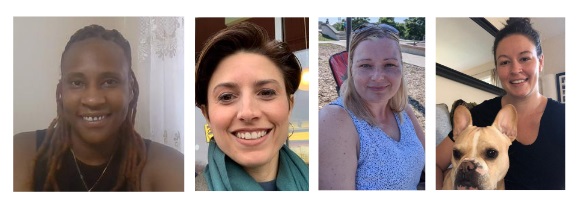By Jane Kitchen, Senior Communications Advisor
Originally published on Connections, the SickKids CCMH staff news site
Aug. 18, 2020
The Day Treatment program team at SickKids CCMH runs a month-long camp every summer. For four weeks, clients attend for six hours a day, with at least one field trip a week. The goal? For these client campers to work on social skills, building healthy relationships in a fun environment.
With COVID-19 restrictions in place, Letrice Davis, Program Supervisor, Intensive Services for Children – Day Treatment, and her team of Child and Youth Care Practitioners (CYCPs) – Cynthia Evans, Simone Toussaint, Elwira Kornacka, Ruth Boafo-Owusu and Sarah Crocker – took what they had in mind for in-person camp and revised it for a virtual program for the nine campers, aged six to 12.
“The feedback we got from kids and parents when we informed them summer camp was going to be virtual was that of excitement and amazement,” says Davis. “Parents were thankful to know there was an alternative option for summer programming.”

The team developed a variety of visually stimulating and tactile experiences the campers could do at home with some involvement by a parent, during the two one-hour sessions each day (one hour before lunch and one after).
Each camper received camp activities boxes at their homes filled with everything they needed for the two weeks, including supplies for such activities as making bracelets, popsicles and playdough; planting beans; bingo; and baking and decorating cupcakes. Physical activity was on the calendar as well, with times for dancing and working out.
The team was committed to the campers having field trips and found virtual options, including tours of a museum, a zoo, and an aquarium, and a tour of Disneyland, complete with fireworks.
What summer camp is complete without singing songs and roasting marshmallows around a campfire? The team offered a summer camp sing-along, led by Catherine McCabe, the manager of the Day Treatment program. Campers found packages of marshmallows and kabob sticks in their activity bin that they could hold up to the fire on screen to “roast.”
Each camper received a scrapbook that they drew in at the end of day, creating a keepsake of their camp activities.
The CYCPs took turns leading activities and helping any of the campers who might need extra support. For instance, if a child was feeling agitated, a CYCP camp leader would visit them in a breakout room and lead them in some movement.
Communication and preparation made the transition to the first-time experience with virtual camp easier and user-friendly for parents and campers. A graphic, child-friendly calendar enabled the campers to know what was on the schedule for the day and parents received a daily email to help their camper prepare.
The team received positive feedback from parents – and campers – on the virtual camp experience. “The kids felt very special, from taking turns being ‘spotlighted’ when they showed others their crafts, to getting their boxes delivered, and looking through to see what activities were in store for them,” says Davis.



